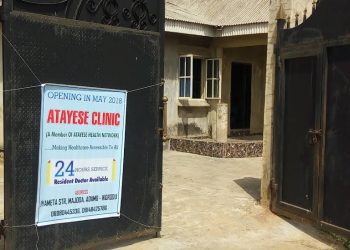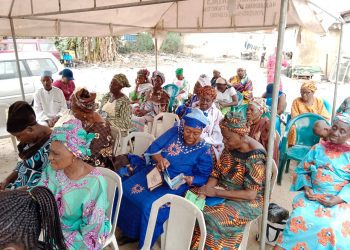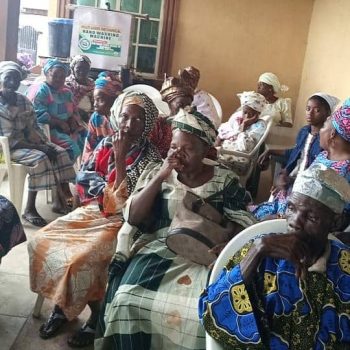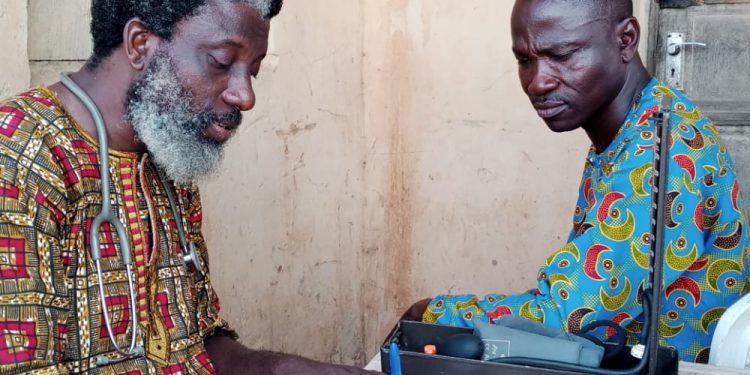All was well with Hajia Ariyike Olorounibe, a 65-year-old resident of Igbogbo in the Ikorodu area of Lagos state, until she got involved in an auto crash with a motorcycle, some years back. The incident led her to the hospital, where she was admitted for months. Pitiably, since she came out of the admission, her life has never remained the same.
The mother of four developed High Blood Pressure (HBP) as a result of the shock she encountered during the accident. She’s forced to visit the hospital perpetually, to control her blood pressure.
“The only problem I have is that I am hypertensive. A few years back, I had an accident that left me in hospital for months. The shock I had led to high blood pressure, which became a recurring ailment for me,” said the retired teacher.
While Olorunibe was obviously getting tired of the incessant visits to the hospital, as well as, the unbearable financial implications; then came a relief via Atayese, an initiative that takes healthcare services to the doorstep of underserved age groups, such as 1-5-year-old children, pregnant women and elderly people of 50 years and above in South West Nigeria, at a very affordable cost.
Regrettably, one of the problems of healthcare services in Nigeria is inaccessibility and unaffordability. According to the National Primary Healthcare Development Agency (NPHCDA), about six in 10 Nigerians lack access to quality healthcare services, a situation that is worsening disease outbreaks and out-of-pocket expenditure.
Atayase, which literally means “repairing the world” is a brainchild of the Atayese Health Network, a pullout from the Society for Love and Social Justice, established in 2013. The Initiative is spearheaded by a medical doctor, joined by his health/medical team.
Present in Ikorodu, Ebute-Meta, and Oyigbo, Lagos; Isonyin, Odogbolu, Odosenbora, and Ijebu-Ode in Ogun State and Foko in Ibadan, Oyo, the initiative runs clinics and hospital services, where people, particularly, within these age groups are treated of health challenges such as hypertension, diabetes mellitus as well as chronic diseases like Parkinson and arthritis among others.
Specifically, the network runs both hospital services and clinics in Oyigbo, Lagos; Odogbolu, Odosenbora, Isonyin, and Ijebu Ode in Ogun State; while in other places, it only holds a monthly clinic, where people come that day and leave.

“Presently, we have a presence in three states. In Lagos, we have programmes at three locations; Ebute-Metta West, Oyigbo and Igbogbo in Ikorodu. In Ogun state, we have presence in the Ijebu part of the state; and we are present in Odogbolu, Isonyin, Odosenbora and Ijebu Ode. In Oyo, we have a presence in Ibadan; that is Foko part of Ibadan.
“Before now, we have tried to reach out to other locations as well, but the recession and lack of resources have made us unable to continue with those places.
“We have been to Ilorin; Tanke in Ilorin; we have been to Oyo town, Isale Oyo to be precise. Even in Lagos, we went to Somolu, we did some months in Somolu before we stopped. We went to Adamo in Ikorodu and we did some work before we stopped. We have been to some other places too,” said Dr. Adeolu Olusodo, Founder/President of Atayase Health Network.
Meanwhile, since its inception, many have benefited from its medical outreach and the network has lost count. In each location, however, there is a health club of between 300 to 350 patients, who meet every month for medical checkups, diagnoses, and treatments.
Besides the clubs, Dr. Adesodo said more than 1000 patients with different ailments are registered in five of the locations where the network has hospitals, which operate 24 hours every day.
“A lot of people have benefitted from our programme. Between Oct. 2013 when we started and April 2014, we had over 200 elderly people coming for our various programmes, those who were treated for hypertension and diabetes and other stuff. Then, we were even giving them free drugs.
“This is specifically free treatment that we were giving to them. By the time we moved to other places, we started attending to more people and I can say that for now in all our over seven centers where we hold health clubs, I can say we have over 350 people that are registered, that come for the wellness clinic.
“In our various hospitals and clinics, of course, we have a lot of people. Some of the hospitals have registrations of well over 1000. So we can’t really quantify for now, how many people really get treatment or attend our programmes.
“But for the health clubs, which hold regular and monthly – wellness clinics, we have over 350 elderly people registered for that programme,” the initiator stated.

Beneficiaries’ accounts
Mrs. Olorunibe is not the only one on the list of beneficiaries, Venerable Kolawole Oke, a retired Anglican clergy, for more than two years, has been enjoying the services of the health network alongside his wife. While Pa Oke, 86, is hypertensive, his 82-year-old wife, Sussan is diabetic; both managing these ailments with care at the health network’s centre in Odogbolu.
The duo joined the health club of Atayese when the healthcare programme of the St. Paul Cathedral in Odogbolu, the headquarters of the South West Dioceses of Anglican Church of Nigeria, which they both belong to, collapsed, as a result of old age and the passing away of many of the donors.
“I was previously in charge of our own diocesan health programme, but we merged about two or three years ago. Invariably, I will say I have benefitted at least close to two complete years of its (Atayese) programme. Basically, we have the benefit of drugs, which were free during that period and in fact, I highly recommended cycling for them, which they provided that we enjoy to exercise ourselves.
“I will, additionally, say that I am a naturopath, which is an alternative to medicine. We were running a medical clinic in my church and I supervised that clinic. It is because when most of the donors to our programmes are now old and some have passed away, that was the reason we decided to merge together with his own,” said the octogenarian.
He, nonetheless, made a case for the refurbishment of the premises being used for the clinic in Odogbolu community.
“All the windows need to be properly netted and also the compound needs to also be improved. Even though they are providing regular water supply in the place, they also need assistance.
Similarly registered at Foko center in Ibadan, Mr. Ibrahim Olasupo said he is healthy now, consequent to the opportunity to carry out monthly checkups and tests, courtesy of the Atayese Health Initiative.
“The benefits of the initiative are many and I am not the only person. It includes our elderly mommies in the neighbourhood. As regards healthcare service, many pray for Atayese Health Initiative due to the drugs we are being given.
“One of the benefits is that I check my blood pressure every month and every three months, my blood sugar. These are two silent killers because many find it difficult to visit health centers for checkups.
“As a result of this accessibility, residents of Asaka Foko in Ibadan appreciate them and always pray for them. There are changes because of the drugs they give, which are almost free. We only paid N300 for patient’s card. If one visits a private or even public hospital, is he going to pay N300?
“Therefore, it is very benefitting. They just yielded our call for a standby nurse who can be attending to people before the monthly clinic. Many people are joining every meeting because the drugs they are given are working.
“Whoever requires a CT scan would be asked to do so and when the results are brought to them, such people will be advised appropriately,” he said.
Mr Olasupo urged other well-meaning individuals to replicate the free health clinic to take care of the medical needs of the vulnerable.

Funding
When the initiative started, funding solely fell on the shoulders of Dr. Olusodo, who out of his passion to impact lives, would buy drugs and dispense freely to patients based on clinical findings. However, this practice, was apparently, deemed not sustainable as the number of enrollees began to astronomically increase.
To be self-sustaining, the initiator introduced payment for drugs at a price they can’t get elsewhere.
“When we started, funding was basically from me. I took it upon myself to fund the programme and we are doing really well. Later, we spread to other places; we had to tune the programme to be self-sustaining. So we make it something that is non-profit, but people have to pay for their drugs; people have to pay one or two things and so we look at what we make and the extent to which we can subsidize for people or give free services.
“Presently now, except for our Ibadan centre, which we have someone sponsoring, where we give elderly people free hypertensive drugs and free diabetic drugs; somebody is sponsoring that particular unit. Then in our Odogbolu centre, we have someone sponsoring five elderly people every month. He takes care of their treatments. Then, I also, personally, do some forms of free treatments. I pay for some elderly people.
“Outside that, what we have basically is that we run our programme to be self-sustaining, and once in a while we have people coming in, dropping things for us for the programme.
“But our focus basically is to make it a self-sustaining programme. So we do not really want to rely too much on donors, but we still look out for people that can sponsor elderly people; can take care of their treatments. That will help the organisation to go a long way to do a sort of treatment,” said the president of the health network.
Yet, there are hurdles
The initiator has a plan to expand to other areas, particularly in the South West and beyond, but lean resources remain the major challenge. For instance, the rising migration of medical experts from Nigeria to the United Kingdom makes it difficult to get healthcare personnel to assist in the suburbs.
“We have a two-point limitation. One is that we do not really have healthcare personnel to help or assist us in the suburbs. Basically, you know we need medical doctors, and we find out it is very hard for us to recruit medical officers for such places.
“As we know a lot of people are traveling out. The other level of healthcare workers that we normally rely upon, they too have really joined the migration trend. We have registered nurses, they too are really traveling outside the country. Even community healthcare workers, a lot of them are going for caregiver jobs in the UK and other places.
“So we find out that it is even difficult for us to get more people working with us in the suburbs. That is one of our major limitations and it is preventing us from even expanding. We are supposed to open a new centre somewhere in Ijebu, but we couldn’t because we want one health personnel to man the place and we don’t want to stretch the personnel we have presently on the ground.
“The second one is on the part of our beneficiaries because they still have to pay some little amounts and we find out that it is why many of them are not turning up, especially in places we have been to, which we could not go again, especially in places like Oyo town.
“We found out that people are willing to come out to access healthcare; they want to enjoy our services, but they cannot really afford the basic things we are asking. For example, the N300 monthly payment that we ask them to do, some could not afford it, hence they would not turn up.
Hajia Olorunibe also noted that the way the clinic is conducted in an open hall in Ikorodu, discourages many, who feel others eavesdrop to hear about their health history.
She advised the network to look for a befitting enclosed apartment, where they could be attending to patients without listening to the complaints of others.
This story has been made possible by Nigeria Health Watch with support from the Solutions Journalism Network, a nonprofit organization dedicated to rigorous and compelling reporting about responses to social problems.

